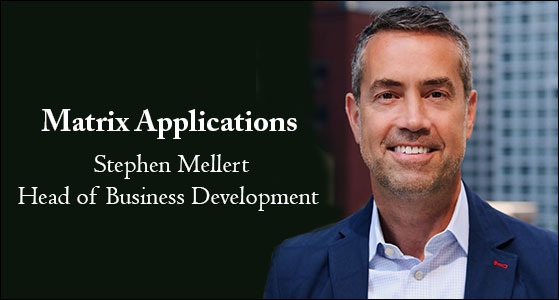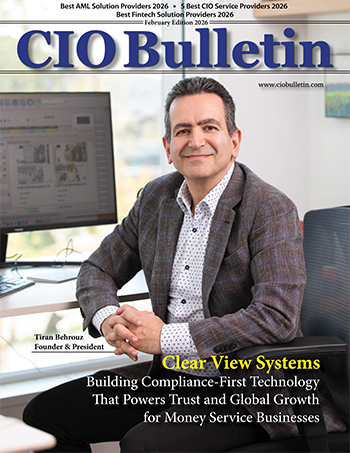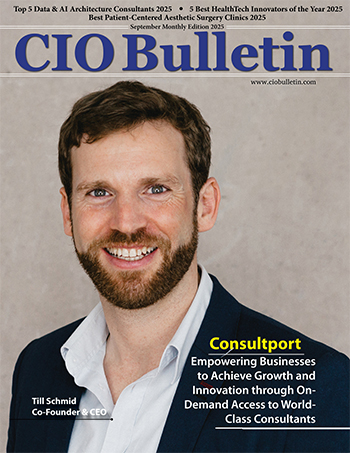50 Most Admired Companies to Watch 2023
CIO Bulletin

Digital innovations and trends in financial technology, or the Fintech industry, are transforming how individuals and financial institutions manage their money. Modern advances have drastically altered how firms operate in the capital markets.
The digital revolution has significantly improved various business areas, with financial technologies playing a significant role in the transformation. Broker Dealers and Banks are increasingly turning to financial technology solutions to improve trade processes and streamline operations. According to experts, the Fintech industry will grow at a 12 percent annual rate in the coming years, reaching revenue of $200 Billion by the end of 2024.
Look no further than Matrix Applications (“Matrix”) for a Fintech solution for institutional fixed income trading and equities securities lending. Matrix Applications is a New York-based Fintech service bureau that provides institutional fixed income trading and equity securities lending with a suite of collateral management, margining, and clearing systems. They are a group of capital markets and systems experts who have been providing financial technology solutions to institutional clients since 2000.
Matrix Applications collaborates with their clients to determine the best combination of services to meet their needs, ranging from systems to back-office operations. They provide clients with the right solution at the right price using in-house and offshore developers.
In conversation with Stephen Mellert, Head of Business Development at Matrix Applications
Q. How have your priorities changed from when you first started?
Matrix Applications was initially established in 2000 to serve its affiliated companies, though after only a few years in existence, two of the largest banks in the world partnered with the firm to help with their fixed income processing and back-office operations. Today, Matrix offers a suite of collateral management, margining, and clearing systems for institutional clients. A brief, historical timeline of key moments in Matrix’s 20+years in business is as follows:
Matrix was founded to provide back-office solutions and fixed-income trading technology to its affiliated companies.
Matrix broadened its clientele from just affiliates to include a number of external clients, such as one of the biggest US clearing banks and a UK bank. Matrix also introduced Managed Services for back-office operations.
Matrix developed MarginCalculator to offer a straightforward answer to the challenging issue of margining forward-settling TBA transactions in order to adhere to FINRA Rule 4210.
Matrix acquired and integrated ReadQ Technologies, expanding its offerings to include QTIX, a multi-asset trade processing system.
Matrix renamed QTIX to "Elevate" and added Next Generation (NG) enhancements and functionalities to the system.
South Street Securities Holdings, Matrix's parent company, secured $90 million in capital from BlackRock and BC Partners, allowing Matrix to accelerate its growth.
Looking ahead to 2023: Growth mode
Matrix's business goals as a start-up in 2000 included establishing itself in the market, building a customer base, and generating revenue. The company had grown over time, developing and acquiring new products and services. Matrix has entered "growth mode" as of today. As a result, priorities have shifted, with a focus on investing in new technologies and other resources to support Matrix's growth in the capital markets. To protect our clients, the company intends to modernize and expand operations while also advancing data, risk, and cybersecurity initiatives.
Q. What is the biggest factor that has helped you be successful?
As the old saying goes, "teamwork makes the dream work," and this could not be more true at Matrix Applications.
Our focus on partnerships with our clients and colleagues has been an important component of our success and steady growth. Promoting collaboration and teamwork helps us draw on the strengths and expertise of others, which can lead to better decision-making and improved outcomes. Additionally, working as a team can help to build trust and rapport with clients, which is essential for maintaining strong working relationships.
Honesty and open communication foster a sense of shared ownership and accountability, which can be critical for meeting business goals. Overall, working collaboratively with clients and colleagues has assisted Matrix in creating a more productive work environment and a positive customer experience, both of which have resulted in better results, such as custom integrations and improved technology.
Q. How do you motivate teams and leaders to embrace change with courage and compassion?
Motivating teams and leaders to embrace change with courage and compassion can be a challenging task.
One way to do this is to focus on the benefits of the change and how it can improve the team's performance and help them achieve their goals. It is also critical to communicate the change openly and honestly and to listen to any concerns or suggestions from all stakeholders. Furthermore, providing assistance and resources to assist the team in navigating changes can make them feel more confident and capable of making the transition. Along the way, it's also important to recognize and celebrate the team's efforts and successes.
Q. What is the company’s vision for the future?
Matrix will continue to innovate its products and services, expand its operations and customer base, and stay ahead of market trends and changes. By driving positive change across institutional firms, the company hopes to become a leader in the capital markets industry.
Matrix seeks to expand into new markets, develop new products or services, and continue to form partnerships with other companies.
Helping companies simplify and automate their trading and equities securities lending processes
Stephen Mellert is the Head of Business Development at Matrix Applications. In 2000, he and the team launched Matrix Applications, a technology service bureau whose clients span from small broker-dealers to asset managers to global banks. He was responsible for the formation and infrastructure development of South Street Securities (SSS), which launched in 2004.
Mr. Mellert is a graduate of Georgetown University and holds an MBA from the NYU Stern School of Business.
https://www.linkedin.com/in/stephenmellert/

Insurance and capital markets







